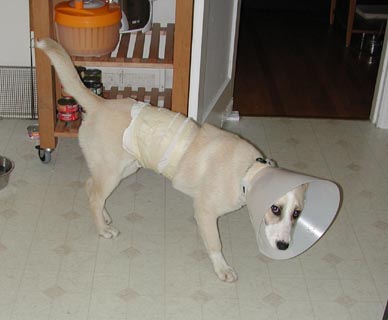
If your dog has a wound it’s not supposed to lick or worry, your vet will likely send you home with an Elizabethan collar. They’re also called e-collars, lampshade collars, or cone collars. Whatever you call them, they’re the pits and you won’t appreciate how awful they are until your pet needs one. Animals wearing Elizabethan collars have reduced vision, run into furniture & walls, have a hard time reaching their food & water bowls, and have a difficulty getting comfortable—not what they need when they’re hurt or sick.
Just days after we got Saffron, we found out she hadn’t been properly restrained after she was spayed–in fact she rode home from the vet in the back of a pick-up. She had to have a compression bandage (that’s the towel with masking tape wound around it) and an Elizabethan collar. I think she worried about what kind of loony people she was living with now who would put her in such an crazy get-up. E-collars add more stress to an already stressful situation, but you still need to keep your pet from licking or scratching or pulling out stitches. The thing is, get one before you need it because you may need to order it and so you can make sure you have the right size. Then if something happens you’re prepared. Here are some other options.
__________________________________________________________
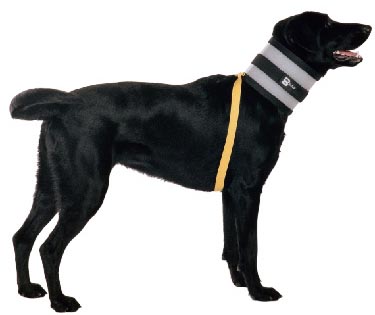
The BiteNot Collar avoids all the problems that come with the Elizabethan collar like reduced vision, hitting furniture, etc. with the collar, and difficulty reaching food and water bowls. It’s made from a length of plastic with good velcro closures. The inside and edges are well padded with high quality foam. It also has a strap that goes behind the front legs to keep everything in place.
__________________________________________________________
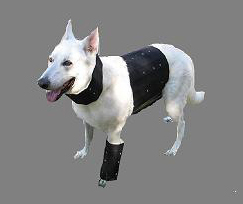 This collar doesn’t look quite as durable as the BiteNot Collar, but it is more versatile and looks useful for trickier tasks. You cut this collar to size and you can customize it. It can also be cut for a splint or used like a compression bandage for the abdomen. And it can be used on dogs, cats, even birds. (It was originally made for a bird named Hagar who had a feather plucking problem.)
This collar doesn’t look quite as durable as the BiteNot Collar, but it is more versatile and looks useful for trickier tasks. You cut this collar to size and you can customize it. It can also be cut for a splint or used like a compression bandage for the abdomen. And it can be used on dogs, cats, even birds. (It was originally made for a bird named Hagar who had a feather plucking problem.)
__________________________________________________________
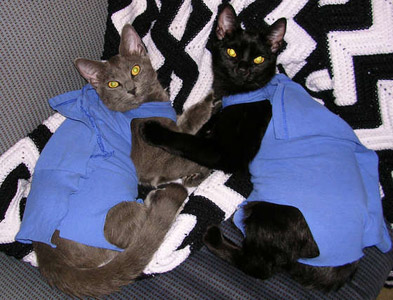 Here’s a handy do-it-yourself alternative for protecting an incision or wound site on your pet’s torso from Instructables. You’ll find good instructions for making a body sock or “cat jacket” out of an old t-shirt.
Here’s a handy do-it-yourself alternative for protecting an incision or wound site on your pet’s torso from Instructables. You’ll find good instructions for making a body sock or “cat jacket” out of an old t-shirt.
This could also be used on dogs, rabbits, ferrets, etc. It might not be enough to stop an obsessive pet from messing with their stitches, but I think it would work with a lot of pets. A side benefit could be that wearing this body sock might help curtail their activity, which is another post-surgery need. Try it out!
__________________________________________________________
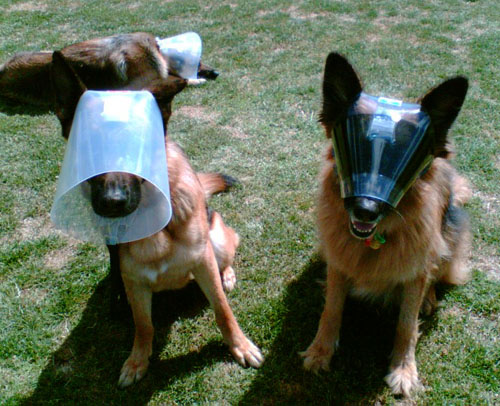 I love it when people care for their pets so much they’re not willing to settle for a crappy status quo. Tasi Stampoultzis developed the Optivisor for his dog, Billy. Don’t miss this video of Billy showing off the Optivisor.
I love it when people care for their pets so much they’re not willing to settle for a crappy status quo. Tasi Stampoultzis developed the Optivisor for his dog, Billy. Don’t miss this video of Billy showing off the Optivisor.
Other E-collar alternatives have addressed the need to keep pets from fussing with stitches, bandages, or wounds on their torso, legs, or tail, but so far nothing has addressed keeping a pet from scratching at their face or eyes. The Optivisor protects the eyes and the upper part of the face from scratching. The Novaguard protects the whole face. Both leave the ears free so the pet can hear, but that also means the ears are not protected, so if your pet is scratching its ears these won’t stop it. (Note: the sizing is for dogs, but I wonder if the smallest size would work for cats.) It looks like you have to get them from veterinary ophthalmologists.
__________________________________________________________
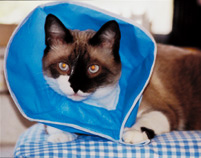 The Trimline Collar is a flexible, lightweight collar that is held in place with a drawstring. Looks like it could work for a laid-back cat, but I’m not sure how well this will hold up to repeated uses by a dog.
The Trimline Collar is a flexible, lightweight collar that is held in place with a drawstring. Looks like it could work for a laid-back cat, but I’m not sure how well this will hold up to repeated uses by a dog.
__________________________________________________________
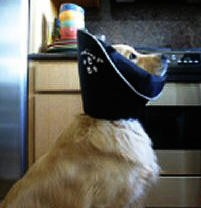 The Comfy Cone is a soft collar that can be folded down if needed and is held in place by your dog’s collar. It’s made of a 1/2 inch of foam sandwiched between durable fabric and it has reflective tape for night time use.
The Comfy Cone is a soft collar that can be folded down if needed and is held in place by your dog’s collar. It’s made of a 1/2 inch of foam sandwiched between durable fabric and it has reflective tape for night time use.
Podcast: Play in new window | Download






